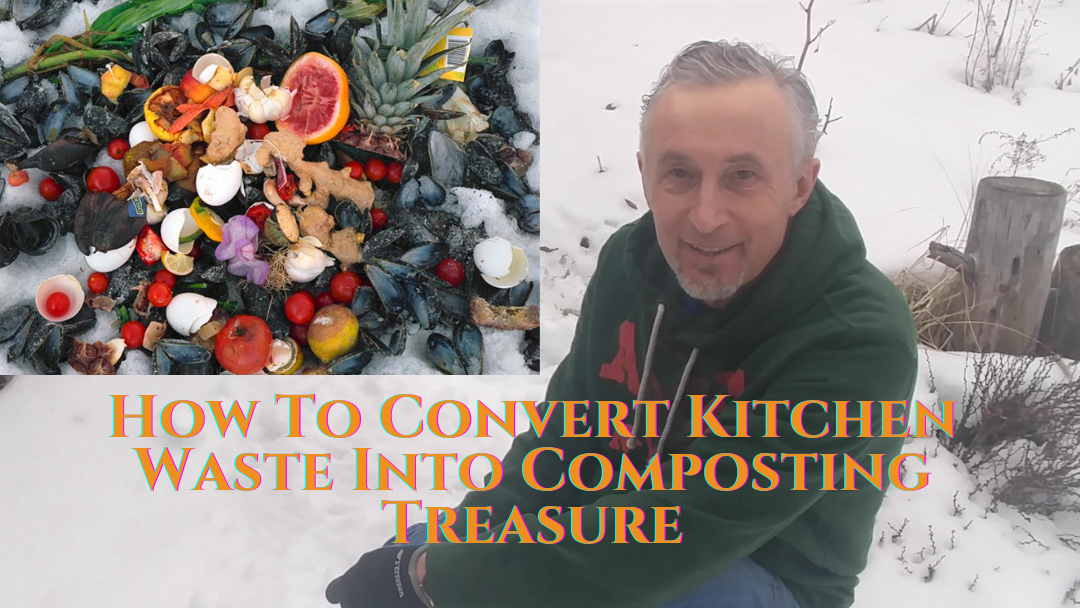Hey folks! What are you usually doing with your kitchen waste?
Dried leaves, grass clippings, pulled weeds, prunings, dead trees and old plants should be returned to the soil (where they originally came from) and reused, not thrown away. I hope you do leave all garden leftovers in garden beds, don’t you? But how about kitchen waste? Kitchen leftovers like fruit and vegetable cuts and peels, coffee grounds, tea leaves, nutshells, eggshells, and more, all of which belong to the same natural ecosystem.
I’m very surprised by the fact that people give out kitchen waste to the city to get composted. How about enhancing the soil in the garden with what we scratch out from the plates after eating? In this blog I describe a shortcut of how you can compose your food leftovers right into the gardening soil. And by the way, that is the same soil that you feed yourself from, the same soil that you work so hard to cultivate.
Think of your garden as a food waste organic recycling factory. Your garden always needs compost, just like you want to eat. Except for the fact that gardens need even more food than humans do – as long as you take food from your garden, you have to pay back to replace it.
And don’t interrupt this cycle; continue to exchange the food with your garden all year long, including winter.
I actually think it’s even more convenient to compost during the wintertime because snow covers waste, preventing lousy odours. The snow also hides away food from animals that are less active during the winter. Which is another benefit! 😃
Melting snow, hail, and rain will speed up the natural process of decay. According to books, this method is called ‘direct composting’. Composting in a pile happens naturally but slowly. When you dump kitchen waste right into the garden, organic materials will gradually be broken down by those friendly and beneficial microorganisms in the soil. These microorganisms don’t create nutrients; they just break down complex materials into loose, peat-like humus that will provide nutrients that growing plants and seeds can consume.
As you lay your waste down right on the bed in mines, you don’t have to turn them regularly as you would have to in a compost pile.
If you are new to direct composting, the best place to start is to find an open area in the corner where no perennial plants are present. You can dump your waste gradually in rows or mine them every time on purpose to fertilize specific areas where the soil might be hopeless – heavy clay, perhaps, or as sandy as beach, in any case – a spot that has a lack of nutrients.
When spring comes and all the snow melts, spread out the dumped piles, mix them into the soil surface, leave it as living mulch or cover with mulch. This way, the decayed material will enrich the soil and the bed will be ready for planting.
You can continue burying kitchen waste mines during the summertime, too. However, I suggest selecting designated areas where your mining will not disturb living plants. Dig a hole, lay down the waste. Add a good amount of soil above to hold water and provide a starter colony of microorganisms. Water the compost carefully. Or even better – create this before the rain. Keep in mind that open waste might attract the animals during warmer months, and that is when a good layer of soil on the top helps too.
You can help by grinding or shredding these materials with a shovel. The finer the materials are, the quicker they decompose, giving a lesser chance that inquisitive animals will dig them up.
Watch how I dump the kitchen leftovers directly into my garden over the winter here:
Let’s count advantages of burying the kitchen waste right in the soil:
- Your gardening soldiers (aka – the worms) will attack the newly added elements and start processing materials right away;
- Because of the topical application, the mines will decompose faster;
- You can skip watering. The natural rain and circulation of the water in the ground will help to moisturize too.
P.S. I’d love to invite you to join my online community if you feel inclined.
If this post has helped you in some way or if you have any further questions I’d be happy to read your comment below.

